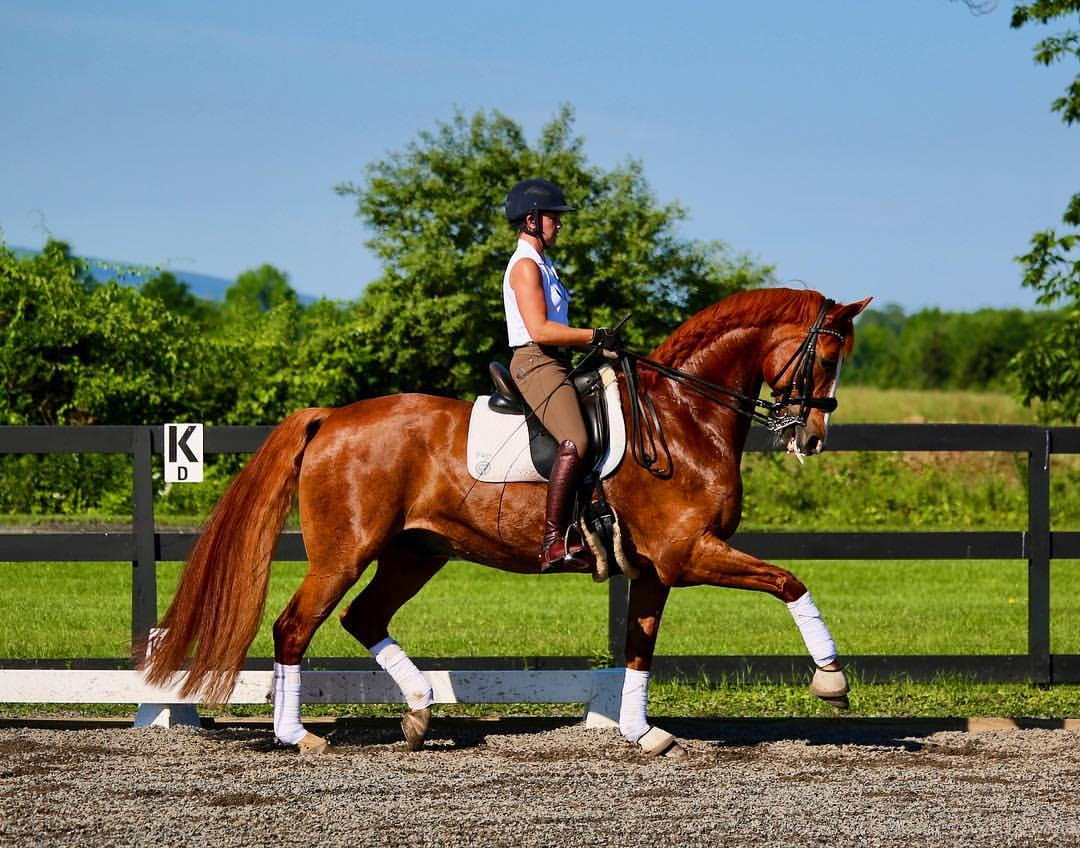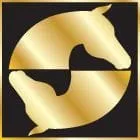
When rider Meagan Davis and owner Scott Durkin think about the goals they have for their dressage horse Royale, they have tunnel vision for the grand prix ring. Royale, a 16-year-old Oldenburg gelding (Routinier x Ironman) was well on his way to accomplishing that goal during the 2019 season when something strange started happening.
After arriving at their winter home in Loxahatchee, FL, from a northern base in Stone Ridge, NY, Davis kicked off Royale’s winter competition schedule with a show in January. The horse was coming off a very successful fall season that included CDI Intermediaire I and CDI Prix St. Georges victories at the New England Dressage Fall Festival and Dressage at Devon.
“Our first show was unusually chilly and I noticed that Royale was breathing a little hard and didn’t sweat very much,” recalled Davis. “I didn’t think that much of it because of the weather, but when we returned home and it warmed up, he wasn’t sweating at all.
“He could not catch his breath after being perfectly fit a month before,” continued Davis. “I rely on Palm Beach Equine Clinic for the care of all the horses in my barn and I immediately turned to Dr. Robert Brusie.”
Dr. Brusie is a Board-Certified Surgeon at Palm Beach Equine Clinic and was diligent about ruling out any physical causes of Royale’s obvious discomfort and decline in performance. After flexion tests, checking for musculoskeletal problems, and assessing soreness or wear and tear, Dr. Brusie turned to Palm Beach Equine Clinic’s Internal Medicine Specialist Dr. Peter Heidmann.
 Meagan Davis and Royale at home. Photo courtesy of Meagan Davis
Meagan Davis and Royale at home. Photo courtesy of Meagan Davis
“Dr. Brusie was watching me work him one day, noticed the decline in muscle, the lack of sweating, and labored breathing, and recommended we take a deeper look with a specialist,” said Davis. “That is why I trust Palm Beach Equine Clinic with the care of my horses. They have so many tricks up their sleeves, and their clients are fortunate that the veterinarians collaborate so well together in order to do what’s best for the horse.”
Dr. Heidmann’s first step was to asses any neurological causes by testing for equine protozoal myeloencephalitis (EPM) and Lyme disease. Both were negative. He then moved on to a nutrient analysis.
“When you see weakness and poor muscle mass in a horse, two of the things you test for right away are vitamin E and selenium deficiencies,” said Dr. Heidmann. “Both are common causes of decreased performance due to low concentrations in local soil or the soil where a horse’s hay derives from.”
No deficiencies were found in Royale, which prompted Dr. Heidmann to move on to muscle testing. He drew blood from Royale, put him in work, and then drew blood again four to six hours later. When comparing enzymes in the blood from before and after work, Dr. Heidmann looked for any large increase, which would indicate the problem was in the muscles themselves. Royale’s tests, once again, came back normal.
At this point, Dr. Heidmann returned to the case history and started following the shortness of breath symptom, noting, “Breathing abnormalities in horses are difficult to diagnose by simply listening because their chest wall is so thick. What I wanted to asses was prolonged recovery. This is done by placing a bag over a horse’s nose to get them to breathe deeply. Once the bag is removed, breathing should regulate within two to three breaths. Royale needed four to five breaths.”
Once Dr. Heidmann identified a possible cause, he performed a bronchoalveolar lavage (BAL), which is essentially a lung sample used to identify abnormal cells. He inserted a small-diameter tube through the trachea, flushed saline into the lung, and then suctioned it back out.
“Sure enough, when I examined the sample, there was mucus and abnormal cells,” said Dr. Heidmann. “Despite his bloodwork being normal and no obvious infections, Royale was battling equine asthma or ‘heaves.’”
The treatment for asthma in horses is very similar to what’s done for humans and includes an anti-inflammatory bronchodilator drug and inhaled steroids.
“While his breathing issues were significant enough to affect performance, Royale’s treatments were relatively mild with immediate and substantial improvement,” said Dr. Heidmann. “I used nebulized herbal remedies, steam, and Ventipulmin, which is an oral syrup.
“I’m a less-is-more person and veterinarian,” he continued. “I try to have the best outcome with the least amount of medications. Additionally, we created some routines that would minimize environmental dust and allergens, such as using a hay net, wetting down hay and bedding, or using chopped newspaper as bedding.”
Royale stayed on the prescribed medication through his trip home to New York and came off them at the end of May. Today, he is back in work and has regained the fitness and muscle he had during the fall. According to Davis, their goal is to step into the grand prix ranks during the upcoming season.
“My favorite cases are the sickest of the sick and the most elusive needle in a haystack,” concluded Dr. Heidmann. “Royale’s case definitely fell into the latter. It was really challenging, but rewarding because the outcome was a horse that is dramatically different than he was four months ago. But the most important part of this case for me was working together with Dr. Brusie. I would have not been successful in helping this horse if he hadn’t done all the work prior to coming to me. That kind of collaboration is what contributes to our success and sets Palm Beach Equine Clinic apart!”

